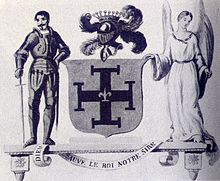noblesse oblige
Noblesse oblige (French for " nobility obliged") describes the concept that nobility goes beyond mere claims and that the person who has such a status is obliged to fulfill social responsibility.
“Noblesse oblige” is an old French proverb that literally means “nobility oblige”. This saying is u. A. Not translated in Dutch and English. Today this means that a prominent social position brings with it special obligations. These extraordinary obligations also expressly relate to social behavior and the fulfillment of a leadership role. In other words: Someone who is privileged by background, money or talent has a duty to do something good and to behave accordingly. The inherent suggestion that this would apply only to those of noble descent has disappeared over time. In countries like the USA , where historically a nobility in the European sense has never been able to develop, the expression “noblesse oblige” is even to be applied exclusively to privileged citizens .
Meaning and variants
The “Noblesse Oblige” is used to indicate that there are additional responsibilities associated with having (or acquiring) wealth , power, and prestige , not legal obligations, but unwritten norms and values .
First and foremost, it often refers to the public roles and responsibilities associated with being famous and influential. This means in particular the responsibility to display good behavior patterns and to adhere to certain standards of decency. The term is also sometimes used to describe a person who willingly blame themselves in order to get a problem or an uncomfortable situation to be amicably resolved. A related saying is: "You are obliged to your stand."
It is sometimes used in ethical discussions to summarize a moral economy in which privileges must be balanced by duties to those who lack such privileges or who cannot perform such duties. After all, recently it has been used primarily to refer to the public responsibilities of the rich, famous, and powerful, particularly to provide good examples of behavior or to exceed minimal standards of decency. It has also been used to describe a person blaming something to solve a problem or save someone else.
History and examples
An early example of this term in literature is found in Homer's Iliad . In book XII, verses 310–328, the Trojan prince Sarpedon gives a famous speech in which he urges his comrade Glaucus to fight with him in the front ranks of the battle.
In the Gospel of Luke , Jesus confirms the concept and says: “But if you don't know him and have done what deserves blows, you will suffer few blows. For whoever has been given much, one will search a lot; and to whom much has been entrusted, all the more will be asked of. ”(Lk 12:48)
In early medieval society, secular power lay with the nobility. In addition to the spiritual leaders, they had control over the judiciary, the (state) government and the conduct of war. Compliance with the laws and regulations issued by them was also enforced by them, if necessary with a "hard hand". These rights were based partly on customary law and partly on written law based on Roman, Germanic and canon law. The so-called 3rd class (the peasants and later also the citizens ) had no rights, only duties towards both the spiritual leaders (first class) and towards the nobility (second class). In addition to working in the countryside and in commerce, they did manual labor for the nobility and clergy , paid taxes and had to do military service. The tasks of the clergy and the nobility were far less clear, but included the administrative tasks such as protection, jurisdiction and basic services for the well-being of the population. So one could turn to this moral, noble duty.
Although "nobility obliges" the nobility obliged to be noble, it gave the aristocracy a justification for their privileges. The reasoning then goes: "As nobles, we have rights, but we also have duties, and these duties confirm our rights."
With the French Revolution (1789–1799) the feudal power relationship came to an end in most West European countries. Rights and obligations were defined more and more comprehensively and carefully and from then on applied to everyone. However, there was a need for guidelines that set the bar higher than the basic rules: "Nobility obliges!"
In Le Lys dans la Vallée , written in 1835 and published in 1836, Honoré de Balzac recommends certain rules of conduct for a young man: “Everything I have just said can be summed up in an old proverb: noblesse oblige!” (Nobility oblige) His advice had comments like "others will respect you because they detest people who have done heinous things".
The set is carved on a sculpture by Lee Lawrie in Bertram Goodhue's Los Angeles Public Library as part of Hartley Burr Alexander's iconographic scheme for the building.
criticism
“Nobility obliges,” while this imposes a duty on the nobility to behave nobly, it offers the aristocracy an ostensible justification for their privilege. This flimsy argument goes: “As nobles, we have rights, but we also have duties; such obligations confirm our rights. "
